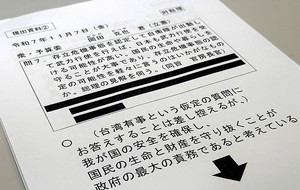REUTERS
May 12, 2021 at 11:35 JST
 People walk past a bank’s electronic board showing the Hong Kong share index at the Hong Kong Stock Exchange on May 11. (AP Photo)
People walk past a bank’s electronic board showing the Hong Kong share index at the Hong Kong Stock Exchange on May 11. (AP Photo)
HONG KONG--More than 40 percent of the members of the American Chamber of Commerce in Hong Kong plan to or are considering leaving the financial hub, with most citing discomfort with a sweeping national security law as one reason, a survey showed on Wednesday.
The legislation imposed by Beijing in 2020, which punishes secession, subversion, terrorism and collusion with foreign forces with up to life in prison, has further strained relations between the United States and China.
The AmCham survey, to which 325, or 24 percent of the business organization’s members responded between May 5 and May 9, showed 42 percent of them had considered leaving or planned to leave Hong Kong. Of those planning to move out, 3 percent said they intended to do so immediately, 10 percent said before the end of the summer and 15 percent before year-end, while 48 percent eyed a move within three to five years.
About 62 percent of those looking to leave ticked “the national security law makes me uncomfortable” as one of the reasons. Some 36 percent cited concerns that the law would impact the quality of their children's education in the city.
“Previously, I never had a worry about what I said or wrote when I was in Hong Kong,” AmCham quoted one of the anonymous respondents as saying.
“That has changed. The red lines are vague and seem to be arbitrary. I don't want to continue to fear saying or writing something that could unknowingly cause me to be arrested.”
Hong Kong authorities deny rights and freedoms have been eroded and maintain that the city is committed to remaining an open, diverse, international finance centre, but say China's national security is a red line.
About 49 percent of those considering leaving blamed coronavirus-related travel restrictions, some 42 percent cited pessimism over Hong Kong's competitiveness and almost 24 percent said the city was expensive.
Among those who intended to stay, about 77 percent cited a good quality of life, some 55 percent an “excellent” business environment and 48 percent the proximity to the mainland China market.
One respondent was quoted as saying they believed Hong Kong was much safer than the United States.
“Hong Kong is still a conduit of the east and west and it has so much more to offer to businesses,” the respondent said.




















A peek through the music industry’s curtain at the producers who harnessed social media to help their idols go global.
A series based on diplomatic documents declassified by Japan’s Foreign Ministry
Here is a collection of first-hand accounts by “hibakusha” atomic bomb survivors.
Cooking experts, chefs and others involved in the field of food introduce their special recipes intertwined with their paths in life.
A series about Japanese-Americans and their memories of World War II